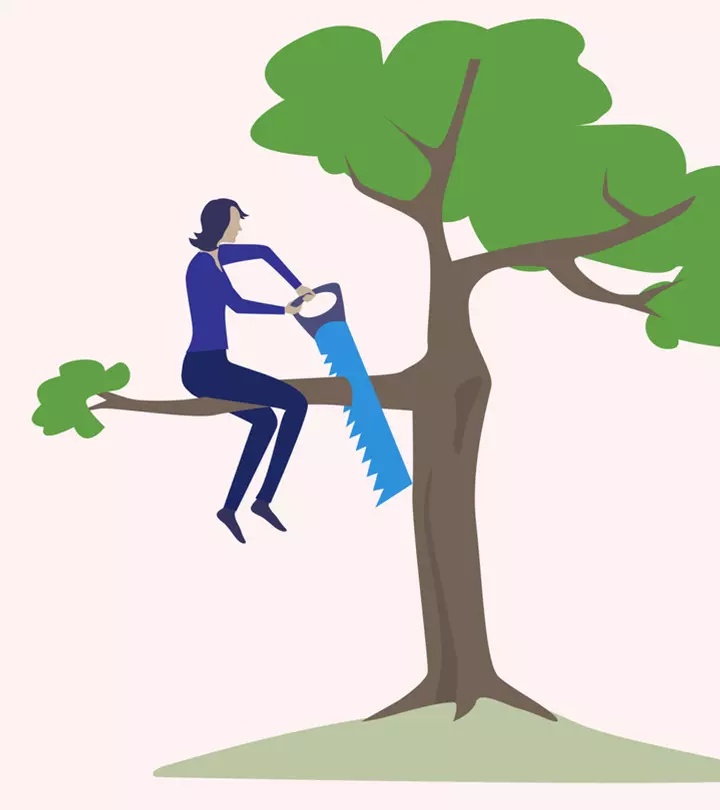14 Signs Of Self-Sabotaging Your Relationship & How To Stop
Sometimes we destroy our happiness and ruin a good thing, but it ends now.

Image: iStock
Self-sabotaging in relationships is a harmful behavior as it threatens your success and is one of the toughest things to deal with. It is like an enemy who knows you completely and attacks accordingly. Psychologists say that it is a subconscious act that permits specific people to destruct their lives. This behavior is often a result of self-criticism, self-doubt, or self-hatred. However, self-harm is different from this; it is when someone purposely hurts to make themselves feel better (generally by imposing pain).
Self-sabotage may not appear as destructive as self-harm, but ultimately it causes more damage in the long run. Be it your job, relationships, or health, almost everything can get impacted due to this condition. Keep reading this article to know more about how these habits develop and affect relationships and tips to control them.
In This Article
What Causes Self-Sabotaging Behavior?

Self-sabotage can happen for a variety of reasons. Perhaps you were raised in a complex environment, and it is part of how you live life. You do not just wake up one morning and decide to sabotage your relationship. Such behavior can be traced back to specific life events or people who made you become this way. However, don’t wait until the signs that your relationship is over become blatantly obvious.
Over time, self-defeating habits can become so deeply ingrained that they are almost automatic, which is why it may be hard for you to see them.
Here are some triggers for self-sabotaging tendencies:
- Things That Happened In Your Past

Self-sabotaging behavior is often caused by an unresolved trauma, such as childhood abuse or the death of someone close, over which the person has had no control. It may even be related to an addiction problem that needs more serious treatment than self-help methods. Patterns established in early relationships may be seen over time in other relationships. Your present circumstance differs from the past, but it may be tough to break out of similar negative habits.
- Fear Of Failure
The reason self-sabotage is so universal, and we all do it to some extent. As infants, we rely on our parents for everything — food, comfort, nurturing, and love. As we grow older, most of us assume that self-worth comes from outside ourselves. Thoughts like, “I’m not good enough” or “My best isn’t good enough” undermine even the most confident person’s productivity and sense of self-worth. Avoiding failure can lead you to avoid attempting in the first place. So, your subconscious mind feeds you with reasons and methods for sabotaging yourself.
- Unrealistic Expectations
Perhaps you have an unrealistic idea of a perfect relationship fuelled by what you see on social media or entertainment pieces such as movies and books. Comparing your relationship to a highly idealized standard can lead to disappointments as your partner cannot live up to it. If you pay attention, you may find yourself constantly nagging, complaining, or trying to emotionally manipulate your partner to fit them into your standards.
- Unhealthy Communication
If you and your partner have not established transparent communication channels, it will gradually lead to misunderstandings, mistrust, and bitterness. Also, if you find yourself unable to communicate in a healthy way, you may resort to self-sabotaging behaviors such as constantly blaming your partner for the smallest things while they do not understand what is making you upset.
- An Attempt In Self-Preservation
Self-sabotage is a coping mechanism that people use to protect themselves from feeling vulnerable or going through a painful experience again. They may also do it while trying to make themselves feel better about their decisions or life choices, trying to escape from reality and responsibility, or fulfilling self-destructive tendencies. Self-sabotaging habits can also be caused by a desire to control events. You may feel safe, strong, and ready to face whatever comes your way when you are in command.
Whatever may be the reason you resort to self-sabotaging, it is clear that nothing good can come of it. So, read on to understand how this behavior can manifest in a relationship and avoid harming your relationship subconsciously or unconsciously.
 Quick Tip
Quick Tip14 Signs You Are Self-Sabotaging Your Relationship
For starters you need to know how to stop being insecure in a relationship. Insecurity is one of the most common reasons for a relationship to fall apart. Apart from this, here are other signs that you are unknowingly self-sabotaging your relationship.

- You Concentrate On The Negative First: Constant complaining may lead to a separation. It’s just as easy to concentrate on the positive as it is to constantly focus on what’s wrong.
- You Must Always Be Right: Compromise is essential in any relationship. However, if you have a need to be right all the time, you will most likely be lonely as well. No one wants to be in a relationship where their opinions are always met with resistance.
- You Show A Lack Of Trust In Your Partner: Trust issues make a relationship hollow from the inside. Anyone who feels continuously second-guessed or that their partner assumes the worst, no matter what they do, will not want to stay around for long. Your partner shouldn’t have to constantly earn your trust unless they have broken any promises previously.
- You Often Talk About Past Relationships: If you constantly discuss or complain about the person who came before your present partner, you will likely leave a negative impression. It is fair if you want to give some background or context to explain any traumatic history or how it affects your perspective in relationships so your new partner can better understand, but you should not be speaking about your emotional baggage with an ex constantly. It’s time to move on; you are with someone new now.
- You Have Outgrown Your Capacity To Be Charming: Romance does not have to end the moment a relationship becomes official. Maintaining a relationship is all about keeping up the romance and making your partner feel loved.
- You Are Pretending To Be Someone You Are Not: It may appear like a wonderful idea to participate in your partner’s interests and pastimes until you eventually confess that you despise those activities. There’s a limited amount of time a relationship founded on inauthenticity can last. Not to mention, pretending to be someone or something you are not is tiring and can become exhausting after a while.
- You Undervalue Your Partner: It’s easy to overlook your significant other just because you are in a relationship. If you constantly criticize your partner’s opinions and feelings and take them for granted, you are on the fastest road to becoming single.
- You Feel Unworthy Of Love: If you have self-esteem issues, it’s time to get the help you need. Your problems are not your partner’s responsibility.
Petula, a blogger, shared how she self-sabotaged her relationships. She writes, “I pushed away people who loved me because I felt I didn’t deserve their love. I pushed away opportunities offered me because I felt I wasn’t ready to tackle them. I pushed away friends who wanted to be there for me because I was independent and didn’t need anyone. I pushed away my family because I felt they wouldn’t understand my strange and unorthodox life as an artist and a creative person. I pushed away lovers whose only crime was that they wanted all of me, not just the crumbs I offered. All of it was self-sabotage, all of it (i).”
- You Don’t Spend Enough Time Together: If this is the case, your relationship is dying a slow death. You need to make more of an effort to see your partner and spend time with them. Quality time and making memories with your partner is an important part of any relationship dynamic.
- You Have Difficulty Expressing Your Needs: You may desire more alone time but you find yourself withholding that need because of fear or insecurity. Your partner would not want to hurt your feelings. It’s better to communicate openly. Communication breakdown is not healthy for any relationship.
- Walking Away Is Easy For You: People expect everything to go perfectly all the time. So, when you feel disappointed, it’s best to communicate with your partner rather than cut ties arbitrarily.
- You Feel Uncomfortable When Things Go Too Well: When a person has had prior toxic relationships, they don’t quite know how to handle a secure and healthy one. As a result, you may believe that you don’t deserve it or something is wrong when things are going well.
- You Make Excuses Not To Be Intimate: Intimacy is important in a healthy relationship. When you start avoiding conversations that matter and make excuses not to have sex, you might be sabotaging your relationship with your fear of intimacy.
- You Don’t Respect Boundaries: When there is a clear line of consent about things between you and your partner, you harm yourself by crossing it. Due to your boundary problems, if you keep violating that line, it gives the impression that you don’t value your partner’s feelings.
It is, thus, important to have mutual respect and open communication in any relationship. If you think you might be engaging in self-sabotaging behavior, go to the next section to understand how you can keep it in check.
Things You Can Do To Control This Tendency

- Always speak from the highest self-esteem. Don’t put yourself down or say negative things about yourself around your partner. Practice self-love, self-compassion, and positive self-affirmations.
- Don’t compare yourself to other people. Realize your self-worth because you don’t need the approval of others to feel good about yourself.
- Start to think about the qualities you want in your partner. It will guide you to make better decisions when meeting people. You can start filtering out those who don’t fit the qualities.
- Start meditating. Self-awareness helps you work through your feelings and avoid acting on impulse. Meditation will help clear your mind of negative self-talk that pumps into your subconsciousness.
- Don’t be greedy or self-centered with your relationship. Don’t rush things or try to corner your partner into moving too fast. Selfless acts are usually what keep the peace when things get tough. It will help keep your self-esteem in check and will prevent you from hurting your partner.
- Control your anger before it controls you. Avoid any form of violence. Anger is self-destructive and, when left unchecked, can put a severe strain on the relationship. It’s not about suppressing your feelings but channeling them in the right direction.
- Be happy for your partner when they are successful, even if it means you are not benefiting from their success. Learn how to be self-satisfied with yourself instead of trying to live vicariously through your partner.
- Don’t wait for your partner to solve your problems. Self-reliance helps develop self-sufficiency and self-esteem. In addition, a strong personality makes better decisions when involved with people and will make them more likely to want to commit to you long-term.
- Be self-assured when you are in social situations. Self-sabotage often happens out of embarrassment or self-doubt. Make sure your confidence is always high so no one can bring you down or make you feel bad about yourself.
- Discover all the bad habits you have and work towards quitting them. A self-destructive person is unlikely to be in a self-sustaining relationship. Your bad self-esteem will be projected onto your partner, creating constant tension and harm.
 Quick Tip
Quick TipThe road of self-growth ultimately leads to healthy relationships. However, if you feel that certain things are overwhelming or out of your control, there’s no harm in approaching a professional. Read on to find out when’s the right time to consult a therapist.
When Should You Seek Professional Help?

When self-sabotage reaches a point where it’s too detrimental to a person’s mental health and daily functioning, it should be considered a form of self-harm. It is then that consulting a professional therapist can prove quite helpful.
However, self-sabotage can also manifest subtly and not affect one’s life in drastic ways. In this case, self-sabotage has more to do with self-esteem and not self-harm. Books can be an excellent place to begin self-improvement in such scenarios.
Self-help books are usually written by experienced psychologists and mental health professionals. They can be very helpful in recognizing one’s issues and self-defeating behavior.
Another way to make progress is to work with a self-help group. It will allow one to see that they are not alone in their self-sabotaging behavior and learn other coping mechanisms.
Working with a self-help group or a therapist are both healthy options for self-improvement that won’t cost you much, compared to the damage self-sabotage may cause.
Infographic: How To Stop Self-Sabotaging
It is unfortunate that a lot of us live in societies designed to limit our growth. Many of us indulge in passive self-sabotaging behaviors without even realizing it. Such behavior not only affects us, but also our relationships. In the infographic below, we have listed the different ways we can stop such detrimental behavior and take control of our lives. Check it out! Illustration: StyleCraze Design Team
Experts say that self-sabotaging in relationships develops due to a person’s traumatic past experiences or fear of failure. Constantly concentrating on negative experiences, codependency, attachment issues, and lack of trust in your partner, and difficulty expressing your emotions can frustrate your partner and create problems in the relationship. To keep yourself from engaging in self-sabotaging behavior, start meditating, control your anger, and realize how special and important you are. However, if self-sabotaging behavior starts affecting your mental health and daily functioning, read books or consult a mental health professional for further help.
Frequently Asked Questions
Do depressed people self-sabotage?
Yes, people struggling with depression may have low self-esteem that may lead to self-sabotaging behaviour and habits.
Is self-sabotaging a toxic trait?
While it may affect the person and those around them negatively in different aspects of life, it’s usually not considered a toxic trait. It can be managed and changed with the right guidance, support, and awareness.
Is self-sabotaging a symptom of bipolar?
Yes, it could be a concerning symptom of bipolar disorderi A mental health condition in which a person experiences extreme mood swings, unusual shifts in energy, insomnia, and depression. .
Is self-sabotaging a symptom of BPD?
Borderline personality disorderi A mental health disorder that leads to extreme mood swings, emotional distress, and unstable relations due the body’s inability to control emotions. affects your thoughts and emotions, and may lead to self-sabotaging acts and behaviours.
Key Takeaways
- Self-sabotaging behavior may be caused by an underlying unresolved trauma, a fear of failure or a need for self preservation.
- Showing a lack of trust, not feeling worthy of love, avoiding intimacy, undervaluing your partner and always focusing on the negatives are a few signs that you are self-sabotaging your relationship.
- You can check this behavior pattern and turn it around by believing yourself to be worthy of love and a good relationship, always coming from a place of your highest self-esteem, and pursuing self-awareness through meditation or therapy.
Uncover the surprising reasons behind self-sabotage in love and learn how to break free from destructive patterns. Discover the keys to nurturing and sustaining healthy relationships. Watch this video now!
Personal Experience: Source
StyleCraze's articles are interwoven with authentic personal narratives that provide depth and resonance to our content. Below are the sources of the personal accounts referenced in this article.
i. Self-Sabotage and me…and maybe you…?https://misstula.wordpress.com/2013/02/24/self-sabotage-and-me-and-maybe-you/
Read full bio of Dr. Holly Schiff
Read full bio of Subhrojyoti Mukherjee
Read full bio of Gazala Firdos Ansari


























Community Experiences
Join the conversation and become a part of our empowering community! Share your stories, experiences, and insights to connect with other beauty, lifestyle, and health enthusiasts.